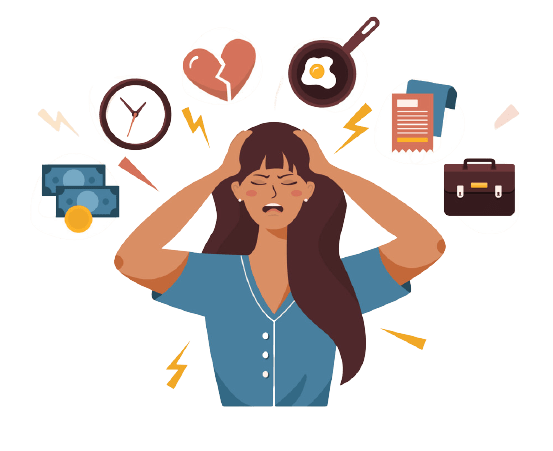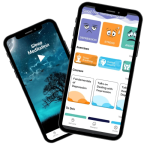Online Panic Attack Therapy | Best Therapist For Panic Attack Help
- Setup a free & confidential chat on your Panic attack issues
- Unlimited help through Panic attack self-care app
- Live Video or Chat sessions with top Panic attack therapists
Begin Therapy
Consult online with best Therapist
Get the best help for Panic attacks
TherapyMantra is here to help you on your path to recovery from Panic attack. We match you with the best Panic attack therapists available 24/7 via video call or messaging.
Match with Panic attack Therapists
We assign the best counsellors experienced in Panic attack issues based on your needs.
Affordable and Effective
Our online sessions are 90% less expensive than in-person therapy, available 24/7.
Self-Care for Panic attack
We offer ongoing Panic attack support through self-care tools, Panic attack help videos, chat groups, meditations, breathing exercises, and other resources.

Wondering if it’s just a phase or something more? Take our Free online Panic attack test to find out?
How it works?
You are matched with a Panic attack counsellor based on your needs and preferences. You get a secure “therapy room” where you can communicate with your counsellor via chat or phone. You can write or talk about Panic attacks & ask questions to deal with Panic attacks.

Register for Panic attack Counseling
Simply complete a 5-minute online form to tell us about your Panic attack issues

Consult with your Panic attack Therapist
We connect you with Panic attack counsellors who are available 24/7 based on your preferences and needs.

Connect to Our App
Apart from Video / chat sessions, our app offers self-care tools, videos and meditations to help you deal with your Panic attack.
Best Panic attack Therapists
Positive conversations, exercises, and meditations are used by TherapyMantra psychologists to help you deal with Panic attack. Our Panic attack therapists outperform traditional counselling as you get matched from a pool of 500+ Panic attack counsellors, who offer 24/7 unrestricted private chat.








What are panic attacks?
Panic attacks are short episodes of intense fear that develop suddenly and peak within about 10 minutes. Symptoms include: Palpitations, pounding heart, or accelerated heart rate, Sweating, Trembling or shaking, Shortness of breath or a feeling of smothering, Choking sensation, Chest pain or discomfort, nausea or abdominal distress, Feeling dizzy or unsteady, Derealisation (feelings of unreality) or depersonalization (being detached from oneself), Fear of losing control or going crazy, Fear of dying. The main difference between a panic disorder and a panic attack is that the main symptom of a panic disorder is recurring panic attacks, whereas the main symptom of a panic attack is an individual episode of intense fear. A person with repeated panic attacks often begins to worry about the potential consequences of another attack and this may lead to avoidance behavior (eg avoiding exercise or public places), which can make it difficult for them to lead a normal life.
Types of panic attacks
Panic attacks are generally classified into two types, namely panic disorder, and limited symptom attack.
- Panic disorder or Panic Attacks without Agoraphobia refers to when the person has experienced recurrent panic attacks over a period in which they have developed some anticipatory anxiety with regards to experiencing more panic attacks in the future.
- Limited Symptom Attack, on the other hand, refers to when the person has experienced panic attacks but without having anticipatory anxiety.
Treatment Options for Panic Attacks
- Cognitive-Behavioural Therapy (CBT), which is highly effective in the treatment of panic disorder and other related anxiety disorders, teaches clients how to reduce fear, both through breathing retraining and through changing thoughts about their panic symptoms.
- Drug therapy is often used in combination with CBT for the best outcome. Benzodiazepines, such as alprazolam (Xanax) and clonazepam (Klonopin), are effective in the short term for treating panic attacks, but they can be habit-forming and should only be used under the supervision of a physician. The antidepressants, clomipramine (Anafranil) and imipramine (Tofranil), are also effective in the treatment of the panic disorder, although they can cause side effects.
- A third choice is a buspirone (BuSpar), which is helpful in patients with generalized anxiety disorder, but not as effective for patients with panic disorder.
If you suffer from panic attacks, it is important to seek help from a qualified professional. There are many treatment options available that can help you manage your symptoms and live a normal, productive life. With the help of a therapist or physician, you can find the treatment that works best for you.
How can therapy help with Panic attacks?
Many different types of therapy can be helpful in the treatment of panic attacks. Cognitive-behavioral therapy (CBT), in particular, has been found to be effective in helping people understand and manage their panic attacks. CBT helps people identify and change the thoughts and behaviors that lead to or worsen panic attacks.
What are therapy treatments for panic attacks?
Other types of therapy that may be helpful include:
- Mindfulness-based therapies, which teach people how to focus on the present moment and accept their thoughts and feelings without judgment
- Exposure therapy, which helps people gradually face their fears and anxieties until they become less afraid and overwhelmed
- Psychodynamic therapy, which helps people understand the emotional roots of their problems
- Cognitive-behavioral therapy, which helps people change the way they think and behave to feel better
If you are interested in trying any of these therapies, be sure to speak with your doctor or mental health professional. They can help you find the right treatment for you.
How to find a therapist for panic attacks?
TherapyMantra can help you find a depression therapist near you. We have over 500+ therapists listed on our therapist directory. You can follow the following steps to find a good depression therapist:
- First, ask your family doctor or anyone else you are seeing for a referral for depression therapist.
- The next thing you’ll want to do is ask your friends and loved ones for referrals.
- The next thing you’ll want to do is look online. There are many websites that help people find therapists in their area who can treat things like depression.
10,000+ Happy & Healed patients

“Therapy has helped me learn how to deal with my anger more constructively. I now understand how to better deal with stressful situations and how to communicate better with my family.”
Kevin,
1 year on TherapyMantra
FAQs
A panic attack is characterised by an intense wave of fear that is unexpected and debilitating, immobilising in its intensity. Your heart is racing, you can’t breathe, and you may believe you’re dying or going insane. Panic attacks frequently occur unexpectedly, without warning, and without a clear trigger.
The majority of panic attacks last 5 to 20 minutes. Some have been reported to last an hour or more. The number of attacks you have will be determined by the severity of your condition. Some people experience attacks once or twice a month, while others experience them several times per week.
There is no single, clear-cut reason why people have panic attacks at night, according to research. We do know, however, that the brain does not switch off’ during sleep, so any pent-up worries or anxieties may manifest in our unconscious brains, resulting in a nocturnal panic attack.
Anxiety can be brought on by a number of factors, including stress, genetics, brain chemistry, traumatic events, or environmental factors. Anti-anxiety medication can help to alleviate symptoms. Even with medication, people may experience anxiety or panic attacks.
The body’s autonomous fight-or-flight response takes over during a panic attack. Physical symptoms are frequently more severe than anxiety symptoms. While anxiety can build up gradually, panic attacks usually strike suddenly. Panic attacks frequently cause anxiety about having another attack.


